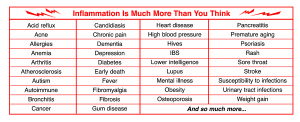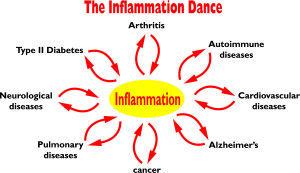
But I don’t feel inflamed?
By Mark J Kaylor
“It was the best of times, it was the worst of times, it was the age of inflammation…” to paraphrase Charles Dickens. But before we start dumping on inflammation we need to understand what it is and what role it is intended to serve in our body. Simply put inflammation is a gathering of our immune troops to do battle to prevent an infection, fight off the bacteria or virus, and/or help the body heal. The problem is that inflammation, like a fire, is very useful. It is only when that fire gets out of control or burns where it shouldn’t that it becomes an issue, possibly even life-threatening.

How is it that the same healthy physiological response we have to a cut or scrape, when out-of-control, can increase our risk for heart disease, cancer, and premature aging? A healthy inflammatory response is one that is self-limiting and controlled; an unhealthy response is one that is excessive, chronic, and inappropriate. The problem is that our bodies and our immune system were designed to produce these brief, intense reactions to acute danger but due to the “modern” lifestyle, just like with the stress response; our physiological processes have just not caught up. (Enlarge Image)
The leading causes of inflammation include our massive consumption of sugars and refined carbohydrates, highly heated and refined vegetable oils, too little or too much exercise, obesity, chronic stress, and widespread use of toxins, including plastics, pesticides, and heavy metals has resulted in an immune system that is constantly on. As with anything else, if continually stressed and pulled in many directions, our immune system can begin to run amok and at times target our own tissues.
Chronic inflammation is linked to numerous health issues that most of us don’t normally associate with inflammation. If the haywire inflammatory response takes place in your joints we label it as osteo-arthritis, if it takes place in your cardiovascular system it becomes heart disease or atherosclerosis, or if it takes hold in your brain we know it as dementia. Fundamentally though, it is all inflammation.
It’s out of control
What can make it so difficult getting to the root cause of our imbalance is that these diseases and inflammation are a two-way street, with inflammation causing or contributing to the disease while the disease itself will feed the inflammation.

Signs of an inflammatory epidemic are:
• Twice as many Americans now have asthma than in 1990
• In the past 3 decades hay fever is up 100% in developed countries
• Allergic dermatitis has tripled since 1960
• Obesity rates are sky high
• By 2025 is estimated that 50 million Americans will have diabetes.
And sadly this is just a tip of the inflammatory iceberg. (Enlarge Image)
The simple fact is that inflammation is sneaky, particularly chronic and systemic inflammation. If there are symptoms we frequently confuse them with something else, we often don’t realize that inflammation has run amok until it reaches a crisis or breaking point. This is why we need to take a proactive approach and think Prevent Prevent Prevent.
What to eat?
It’s actually fairly simple. Just take a look at the list of causes of arthritis and I bet you pretty much can figure out what to do. You really don’t need to be a medical doctor to answer this one. Diet is really at the center of an affective anti-inflammatory lifestyle. Unfortunately the Standard American Diet (SAD) is literally built for inflammation with its overreliance on refined carbs and cooking oils, processed foods, chemical additives, and factory farmed meat. The diet is quite straightforward. You want to eat more colorful, whole fruits and vegetables. The key here is variety and lots of colors.
When it comes to fats try to eat more whole fats rather than isolated and refined ones. Eliminate trans or hydrogenated oils and limit your consumption of fried foods. Examples of this are whole seeds and nuts rather than isolated and refined oils.
If you are a meat eater try switching to organic and grass fed and limit your consumption to no more than 2 or 3 times a week. Naturally raised pastured animals are high in the substance called CLA which research has shown may lead to fewer heart attacks.
Some foods of special anti-inflammatory note are broccoli and cruciferous vegetables, mushrooms, sea vegetables (a.k.a. seaweed), wild salmon, fermented organic soy, papaya and pineapple, along with plenty of spices particularly turmeric, ginger, cinnamon, rosemary, and basil, close and cayenne. And don’t forget what may be the superfoods of inflammation, berries; any and all kinds.
Eating less can also help for two reasons, first large meals tend to raise inflammatory markers and second smaller meals can help us lose weight. Abdominal and visceral fat are particularly inflammatory promoting. We want to not just cut back on overall food consumption but particularly on refined sugars and carbohydrates in particular. These foods are very reactive in the body and contribute to inflammation in a number of ways and on a number of levels. Research shows that multiple blood sugar spikes that come with overconsumption of refined carbs can induce systemic inflammation.
Supplemental support
I’m never quite sure if tea should be discussed with diet or supplements, but either way, both green and black teas are very beneficial combating inflammation. They have been shown to benefit inflammation reduction through several mechanisms including genetically, as well as reducing inflammatory stimulating cytokines all the while increasing anti-inflammatory cytokines.
Two absolutely must have allies in our quest for a more balanced inflammatory response are Omega 3 fatty acids and the spice turmeric. I won’t go in to detail on either of these since they have been written about and talked about over and over but I cannot stress enough the essentialness of utilizing these 2 very powerful inflammation reducers and balancers. Both bring benefits that go well beyond anti-inflammatory actions and really need to be considered fundamental and basic supplements for all.
There are 2 key enzymatic pathways involved in the inflammatory process. The first is called COX-2 that can be significantly impacted with the use of turmeric. 5-LOX is the other. Unfortunately both conventional and alternative medicine has overly focused on the COX-2 pathway but new research has suggested that inhibiting both COX-2 and 5-LOX results in greater benefits and less downsides. 5-LOX itself has been linked to 7 of the top 10 leading causes of death. Using an herb called Boswelia can profoundly inhibit the 5-LOX pathway and research has shown it to benefit rheumatoid arthritis, Crohn’s disease, asthma, osteo-arthritis, and IBD. The synergistic actions of turmeric and Boswelia make for some potent anti-inflammatory medicine.
If you have read any of the other articles I have written you know that I have a strong preference for what are called tonic remedies. These powerful systemic and balancing healing aids often benefit inflammation reduction along with their wide ranging healing gifts. There are 3 of special note here that cannot only enhance your efforts to bring balance to your inflammatory processes but balance, health, vitality, immunity, and so much more to your body as a whole. The 1st is the Reishi mushroom, which is so amazing that I call it the “tonic for the 21st century”. It is an effective anti-inflammatory agent that balances the immune system while supporting the body’s detoxification processes. The 2nd is a remedy from, of all places, the beehive, called propolis. Propolis has been shown in studies to inhibit the release of several pro-inflammatory compounds including prostaglandins, leukotrienes, and histamine. And last but not least is another mushroom called Chaga. This Siberian mushroom that grows on birch trees powerfully reduces inflammation while strengthening and boosting the organism (this means you) as a whole.
So by making a few easy and healthy dietary adjustments and incorporating a handful of nutritional supplements you can give your body a balanced and better inflammatory and immune response.
No better time than the present
So what will an anti-inflammatory lifestyle get you? Try: a decreased risk of such chronic diseases including arthritis, dementia, diabetes, and heart disease; a decreased risk of developing cancer; improved psycho-emotional health; and possibly even a longer life. To top it off, if this isn’t enough, it may help you keep your good looks. So don’t wait for it to get out of control. Don’t wait for it to cause health problems. Now is the time to adopt an inflammatory preventing and fighting lifestyle. Now is the time to keep the fires under control and put to proper and good use. The path to keeping inflammation under control is balance and not just incorporating anti-inflammatory remedies but to think anti-inflammatory lifestyle.
